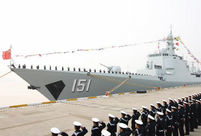Hazardous environment
It's extremely unlikely such land is fit for cultivation, says Gong Yuyang, managing director of ESD China, an environmental engineering company.
"If the factory was built on the land for only a short period and had effective protection, if the soil were not heavily polluted, then it could be reclaimed," he tells the Global Times, "but that situation is rather rare."
Li Shuyou has been leading an island lifestyle for about nine years: his house in Xiaotun village, Fengrun district of Tangshan, stands almost alone, surrounded by private factories. There's not a day he comes home without smelling pollution in the air, he tells the Global Times.
The villagers in Xiaotun have no good drinking water and rely on bottled water. There's a well, but the water quality is terrible, Li says.
The death of the factories in October inspired a little hope, Li says. The well water is already much better, he believes.
Steel mills pollute not only water and air, Gong says, but soil as well: "heavy metal, aromatics, petroleum-related, inorganic and sulfide stains," he lists.
Heavy metal harms soil and poisons crops with hazardous substances, Gong explains.
"Pollutants enter the human body by means of breathing, body contact or food ingestion," Gong says. "Once it accumulates in the body, it greatly increases the risk of cancer."
Illegally high levels of poisonous heavy metals were found in southern Chinese rice in May last year when eight out of 18 batches of rice tested by authorities in the southern province of Guangdong were found to contain excessive amounts of carcinogenic heavy metal.
In response, Guangdong took the unprecedented step of naming those rice producers whose products contained "excessive amounts" of cadmium.
 |  |
 Chinese Consulate General in S.F. burned for arson attack
Chinese Consulate General in S.F. burned for arson attack Roar of J-15 fighter is melody for operator on the Liaoning
Roar of J-15 fighter is melody for operator on the Liaoning A 90-year-old forester's four decades
A 90-year-old forester's four decades Most touching moments in 2013
Most touching moments in 2013 2013: Joys and sorrows of world politicians
2013: Joys and sorrows of world politicians Missile destroyer Zhengzhou commissioned to Chinese navy
Missile destroyer Zhengzhou commissioned to Chinese navy China is technically ready to explore Mars
China is technically ready to explore Mars Photo story: Life changed by mobile technology
Photo story: Life changed by mobile technology Bullet train attendants' Christmas Eve
Bullet train attendants' Christmas Eve Most touching moments in 2013
Most touching moments in 2013 Chinese helicopter saves 52 in Antarctica
Chinese helicopter saves 52 in Antarctica PLA self-propelled guns firing in drill
PLA self-propelled guns firing in drill Those That Shaped 2013
Those That Shaped 2013 Yearender: Animals' life in 2013
Yearender: Animals' life in 2013 Hello 2014 - Chinese greet the New Year
Hello 2014 - Chinese greet the New YearDay|Week|Month